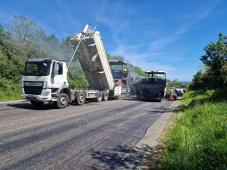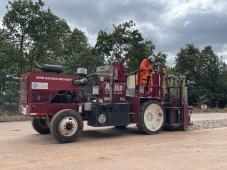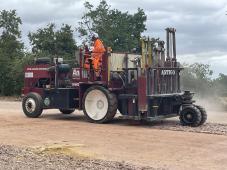Live Labs 2 blog - an update from the Wessex project
This month the Live Labs 2 project update comes from the Wessex team. Ricky Beecroft, Innovations Project Manager for Colas and Programme Manager for the Wessex Live Labs 2 net zero corridors initiative, shares the latest news and developments from the team.
The Wessex Live Labs 2 project is now eight months away from the end of a 3-year programme. We continue to make significant strides in transforming how local highways are maintained, focussing on innovation and collaboration.
On the national stage
Recently the Wessex team have been active on national platforms including the LCRIG Innovation Festival and are planning to attend Highways UK. We also have an article on Carbon Budgeting that will feature in a forthcoming issue of Highways Magazine. This is all a critical part of sharing what we have learned and ensuring the innovations can be integrated into business as usual across the sector.
Somerset
Somerset’s work on the A38 corridor, where in-situ recycling of 50-year-old concrete using rubblisation techniques to reduce carbon emissions is complete. This is part of a broader resurfacing programme that includes Chelston roundabouts and the Silk Mills area. Other highlights include the Comeytrowe footway resurfacing scheme, which trials two treatment options using high RAP, biogenic binders, and warm mix asphalt—projected to deliver up to 45% carbon savings. In addition, the B3139 side of the project is also testing early lifecycle interventions like Rhinophalt.
Hampshire
Hampshire’s corridor and service-wide innovations span materials, plant and vehicles. These include warm mix asphalt, BioBinder, CRBM, recycled sub-base, and low-carbon aggregates. Trials are under discussion for a 'Re-heater' to recycle spent asphalt. Hydrogen power units and electric sweepers and jetters are also being reviewed at a business case level. We look forward to providing updates on these in due course.
Cornwall
Cornwall has completed work at Madron, including pre and post-drone surveys. Excitingly, the A391 scheme is largely complete, with final drainage and planting tasks scheduled. The Green Pastures scheme has been scaled back and is set to begin later in the programme, focusing on sign rationalisation and minor works.
Project successes
The Highways Doughnut Toolkit is now complete and scheduled for launch in October, we will be in the sustainability theatre at Highways UK sharing the toolkit and our learning, so please come along and say hello.
We are also pleased to announce that a Sector Doughnut Alliance has been established, with three workshops planned to explore systemic gaps in the sector. The final output is expected to be a comprehensive guidance document and toolkit, that will capture all project learning to date.
The second Carbon Budget Workshop has been completed, with work now focused on defining the remaining seven corridor budgets and exploring how these can be integrated into business-as-usual operations. A new direction appears to be emerging which is the development of a service-wide carbon budget that can be broken down into corridor-level targets.
The Lean Travel Carbon Review aims to reduce emissions by optimising processes and the methodology includes value stream mapping, baseline data collection, root cause analysis (FMEA), and implementation planning. By looking at the current process for traffic management inspection we can better understand how we can improve it using low carbon alternatives. A good example would be to say that if we have 8 vehicles driving around all of the time checking on traffic management, what can we do with routes or technology to bring that number of vehicles down to seven or six? This aspect of the project links in with carbon reduction element and was introduced early in year two of the initiative; after we identified vehicle emissions as a larger than anticipated contributor to overall carbon in the highways maintenance sector.
Initial interviews have been conducted, with follow up sessions planned to define the approach so watch this space.
Carbon baselines and next steps
Carbon baselines have been completed for most corridors, including Comeytrowe and the A38, with B3139 and Green Pastures in progress. Power BI dashboards are being used to visualise baseline data and track innovation impacts. The goal is to complete baselines and experimental carbon savings for all nine corridors and ensure all innovations are captured in the Innovation Scorecard.
As the Wessex Live Labs 2 project moves into its next phase, our focus remains on delivering measurable carbon reductions and building resilience into our networks.
With the strong momentum we’ve managed to achieve along with collaborative partnerships and a growing toolkit of innovations, we feel well positioned at this stage of the programme and able to share a wealth of knowledge and data across the sector.
Further information
- For more information on ADEPT Live Labs 2: Decarbonising Local Roads in the UK, please look at the Live Labs 2 section on the website
- You can find further information on the Wessex Live Labs 2 project here
Author
- Ricky Beecroft, Innovations Project Manager for Colas and Programme Manager for the Wessex Live Labs 2 net zero corridors initiative




